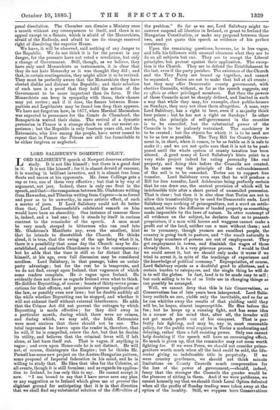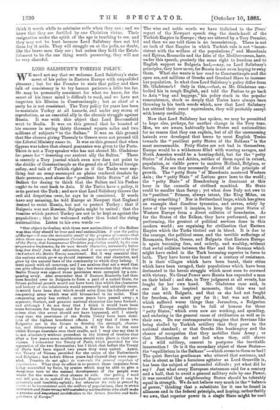LORD SALISBURY'S DOMESTIC POLICY. L ORD SALISBURY'S speech at Newport deserves
attentive study. It is not like himself ; but there is a good deal in it. It is not like himself ; for it is almost devoid of rancour, it is wanting in brilliant invective, and it is almost free from flouts and sneers at his opponents. Mr. Jesse Collings gets a rap or two, one of them very effective ; but that is by way of argument, not jeer. Indeed, there is only one flout in the speech, and that—the comparison between Mr. Gladstone writing from Hawarden, and Tiberius writing from Capresa—is so forced and poor as to be unworthy, in mere artistic effect, of such a master of jeers. If Lord Salisbury could not do better than that, Lord Beaconsfield's celebrated remark on him would have been an absurdity. One instance of rancour there is, indeed, and a bad one ; but it stands by itself in curious contrast to the remainder of the speech. A man must be very much steeped in bitterness who can read into Mr. Gladstone's Manifesto any, even the smallest, hint that he intends to disestablish the Church. He thinks aloud, it is true, that the swing of the age being what it is, there is a possibility that some day the Church may be dis- established, and comforts Churchmen as to the consequences ; but he adds that the time is still so far distant that for himself, at his age, even full discussion may be considered needless. Lord Salisbury, in that passage; takes an unfair party advantage ; but for the rest he is temperate, and we do not find, except upon Ireland, that vagueness of which some readers complain. He is vague upon Ireland. He evidently does not know as regards Ireland even what to think. He dislikes Boycotting, of course ; boasts of thirty-seven prose- cutions for that offence, and promises rigorous application of the law, or possibly even new laws ; but he doubts audibly all the while whether Boycotting can be stopped, and whether it will not exhaust itself without external interference. He adds that the Crimes Act did not prevent the outrages by which Boycotting is made effective ; for they died away in a particular month, during which there were no crimes, and during which, we may add, the Irish Extremists were most anxious that there should not be one. The total impression he leaves upon the reader is, therefore that he will, if he is compelled, renew the Act, but that he doubts its utility, and believes that the criminal fever will, if left alone, at last burn itself out. That is vague, if anything is vague ; and even upon Home-rule he is not distinct. He will not, of course, disintegrate the Empire ; but he thinks Mr. Parnell has some new project on the Austro-Hungarian pattern, some proposal of Imperial federation in his mind, and he is willing to study that. He likes that idea for the Colonies, at all events, though it is still formless; and as regards its applica- tion to Ireland, he has only this to say. He cannot accept it now. "I am bound to say that I have never seen any plan or any suggestion as to Ireland which gives me at present the slightest ground for anticipating that it is in that direction that we shall find any substantial solution of the difficulties of
the problem." So far as we see, Lord Salisbury might to- morrow suspend all liberties in Ireland, or grant to Ireland the Hungarian Constitution, or make any proposal between those two, and yet quote this speech as evidence of his perfect consistency.
Upon the remaining questions, however, he is less vague, and tells his followers with unusual clearness what they are to do on all subjects but one. They are to accept the Liberal principles, but protest against their application. The excep- tion is the Church. They are to defend the Establishment to the last, even if the party perishes. The existence of the Church and the Tory Party are bound up together, and cannot be separated. Tories are not to make that bid at all events ; but they may offer Democratic county government, with elective Councils, without, so far as the speech suggests, any ex officio or other privileged members. But then the powers of these Councils must be sharply defined, and limited in such a way that while they may, for example, close public-houses on Sundays, they may not close them altogether. A man, says Lord Salisbury, has a right to beer, even if a majority think beer poison ; but he has not a right on Sundays In other words, the principle of self-government in the counties is to be conceded, but the substantial power of the Councils is to be jealously restrained. The machinery is to be created ; but the objects for which it is to be used are to be as few as possible. The Tory Bill for County Govern- ment is, in short, when it comes, to be as feeble as it is safe to make it ; and we are not quite sure that it is not to be post- poned until the whole system of county taxation has been altered. A good many of Lord Salisbury's hints point to a very wide project indeed for rating personalty like real property, and doing this before the Councils are created. In the same way the principle of the enfranchisement of the soil is to be conceded. Tories are to support free transfer. Lord Salisbury even Bays that he will produce a Bill for free transfer, Lord Ashbourne being perfectly certain that he can draw one, the central provision of which will be indefeasible title after a short period of unassailed possession. That is clear ; but then it is also clear that Tories are not to allow this transferability to be used for Democratic ends. Lord Salisbury says nothing of primogeniture, not a word on settle- ment, and treats the diffusion of landed property as something made impossible by the laws of nature. In utter contempt of all evidence on the subject, he declares that as to peasant- proprietors, if a man with horses and waggons cannot make a profit out of the land, neither can a man without them ; and as to yeomanry, though yeomen are excellent people, the country is going back to pasture, and "the result naturally is that large numbers of persons are out of employment. They get employment in towns, and diminish the wages of those already there. It is a very grievous process. I would to God we could arrest it, but we should only make it worse if we tried to arrest it, in spite of the teachings of experience and the knowledge of political economy." Expropriation, of course, Lord Salisbury rejects as a doubtful good to allottees, and a certain burden to ratepayers, and the single thing he will do is to sell the glebes. In fact, land is to be made easy to sell ; but such selling is to be of as little use in changing things as can possibly be arranged.
Well, we cannot deny that this is fair Conservatism, as Conservatism has of late years been interpreted. Lord Salis- bury outbids no one, yields only the inevitable,, and so far as he can whittles away the results of that yielding until they will be, he hopes, almost imperceptible. He flies before the foe ; but he keeps up a running fight, and has some idea in a corner of his mind that, after all, the invader will not get much profit out of his conquest. That is per- fectly fair fighting, and may be, nay is, moat reasonable policy, for the public weal requires in Tories a moderating and delaying, rather than a full resisting power. Only one cannot help doubting if the speech will have an encouraging effect. So much is given up, that the remainder may not seem worth fighting for. If we were Peers, we should not consider primo- geniture worth much when all the land could be sold, the life- renter giving an indefeasible title in perpetuity. If we were country gentlemen, we should not think minute limitations on County Councils much compensation for the loss of the power of government,--shoald, indeed, fancy that the stronger the Councils the greater would be
the pleasure of sitting in them. And if we were publicans, we cannot honestly say that we should think Local Option defeated when all the profits of Sunday trading were taken away at the option of the locality. Still, we suppose born Conservatives think it worth While to minimise evils when they can ; and we know that they are fortified by one Christian virtue. Their resignation under the spirit of the age is touching to see, and they may not be hurt because Lord Salisbury does not bid them lay it aside. They will struggle on at the polls, no doubt, like the brave men they are ; but unless they hold the Estab- lishment to be the one thing worth preserving, they will not be very cheerful.



































 Previous page
Previous page